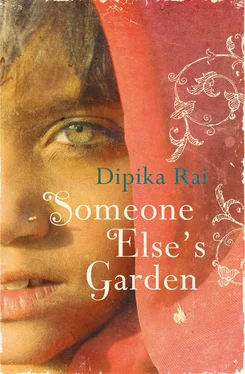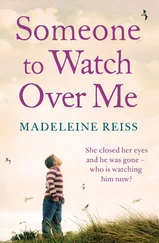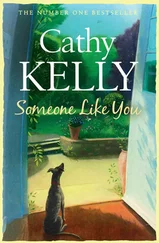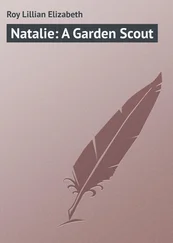‘Just listen to my granddaughter. Cooing like a pigeon. All the time she wants to hear only that story. I try and tell her about our gods, but she only wants to hear about us humans.’
‘Mamta, you cannot know the world by peeping through a keyhole. Always the same old stories,’ says Lata Bai.
‘Okay, Nani, then tell me about Aunt Lucky Sister and how she sent her husband packing, or about Amma’s brother who was stolen by the bandits.’
‘Ha, ha Lucky Sister . . . Go on, Lata, you tell your daughter about that sister of yours. All I can say is that you have to be prepared for anything after marriage . . . it can be heaven, it can be hell . . .’
‘Amma, let’s not talk about that now. Mamta will have a fine marriage,’ says Lata Bai cautiously.
But the grandmother hasn’t had company in a long time, and like a starving child who gorges itself to sickness, she can’t stay away from saying too much, from giving away painful memories lightly, no matter how heartsick it might make the three of them. ‘I married my daughters, your amma’s sisters, just before the drought. That was lucky, because after that, no one would have come to claim them. You remember the drought, Lata. It was so bad that the earth cracked and split like chapped skin.
‘Hai, I wasn’t lucky with my daughters. My eldest simply disappeared after her wedding day. We suspected she was dead, because there was never any news. My second, who moved five miles away, came home three times with a huge gash on her head. Each time I gave her a paste of turmeric and sacred basil to bind on her wound and sent her back. After the third time, she stopped coming home too. My third daughter, Lucky Sister, married an engine driver. Everyone said lucky girl. She came home every other year with saris for everyone . . .’ The grandmother stops, even she can’t say the words. It was through well-side gossip that they learned the true story behind the saris and Lucky Sister’s happy marriage to a rich engine driver. Her rich engine driver husband put his own wife out to work, setting her up in a little hut behind the station. First it was just her husband’s friends who came to spend an hour or two with her, but later, she slept with anyone. Once she became established, she threw her pimping husband out of her house. Now she has six other girls working for her. No one in Lata Bai’s family speaks of Lucky Sister any more.
‘So what about my fourth auntie?’
‘Your fourth auntie was married at eight, like your amma.’
‘Yes, and like me, she too had to wait for her period to arrive before her husband claimed her,’ says Lata Bai.
‘Hai, so young. Imagine if . . .’ says Mamta, eyes wide.
‘Oho, it was a different time, that’s all,’ replies the grandmother.
‘A different time?’ Lata Bai laughs bitterly. ‘I suppose you could say that it was a different time.’
‘So? What? Do you blame me, Lata? Do you think I had any choice? Don’t you remember that damned drought? I can still remember the tiniest details . . . the sky a constant blue; the moon on its back, surrounded by a dance of stars, so still, so lifeless on scorching, murderous nights; the cicadas stopping mid-chirp and falling to the ground like dead leaves; the well water turning bitter; your bapu praying for rain; giving all our food to the priest who promised us rain; the rains not coming for six months; the crops drying up . . .’
‘Even so, you should have checked up on the family, on their customs . . .’
‘Yes, yes, we should have. I suppose you believe we could have. There were no marriage offers for you girls . . . Oh, Mamta, you should have seen it: all round us, girls were dying of hunger. Lata, how can you forget the pickled pea plants so easily?’
‘Yes, yes, the pickled pea plants . . .’ Lata Bai’s voice is flat, emotionless. ‘I haven’t forgotten. Amma pickled all the withering plants she could find, just pickled them right down to a soup in salt. That’s what we lived on: pickled pea plants. There were always heaped spoonfuls of green pickled soup for Bapu with a wheat dumpling or two . . . all three meals. Bapu reached a point when he couldn’t swallow any more salt. Just the sight of pickled pea shoots made him want to run outside and look for a drink of water. Salt goes with water. But there was no water . . .’ She can still remember the time her father threw his plate in her mother’s face, splattering her clothes with green pickle stains, blaming her for the drought, the salt and no water. Her mother scraped the stains off her clothes and put them back in the pickle jar again. Nothing was wasted. She stayed in those stained clothes till the end of the drought.
‘That’s when my sisters started to die . . . one by one.’
‘But not your amma, she was a survivor. Lata found food in anything . . .’
‘I would walk up and down the riverbank collecting anything I could eat. A fallen bird, a sparrow’s nest, lotus seeds, reeds, anything. Sometimes I’d come back with the last rotting wild potatoes of the season, sometimes with dried berries still hanging on brittle stems. The lotus seeds I ate alone, in the shade of a dune. Those I never took home. Perhaps that’s how I survived, on a handful of lotus seeds . . . But, Amma, I never told you about the rotting cow. You remember Radha, my friend who got sick and died? She ate cow meat . . .’ says Lata Bai still afraid to tell the whole truth. It wasn’t just Radha who ate the cow, she did too. Neither of them told. The villagers would have killed her before the drought did for eating the cow. Lata Bai ate only the hooves. Threw them into a grass fire which she kept going for five hours. The hoofs melted and as soon as they started to drip, she caught the drip on a stick, blew on it and popped it into her mouth. Radha wanted the meat. That’s why the day after Radha was dead and she wasn’t.
‘Yes, and you ate the hooves. I knew about those,’ says Lata Bai’s mother.
‘You did?’
‘Oh, forget it, Lata. We’ve all done worse things in our lives.’ It is clear this is the first time Lata Bai and her mother have spoken honestly of those days.
‘If you knew about the hooves, why did you give me my sisters’ food? That’s why they died, because I ate their food . . .’
She physically bites down into those old images, clamping her jaw shut. Lata Bai remembers her youngest sister: two big-moons-in-the-water eyes looking around at the world. First lively, looking for anything that might help her live, a game, a laugh, a touch. Then looking around more slowly, for something to ease the pain. Lata Bai cut her sari in two, the only one she owned, and made a sling for her sister. Each time before she left to look for food by the river, she’d give her sister a huge swing. Her other sisters didn’t expire quite so quietly. They screamed their terrible screams and fought with her to the end, biting and kicking, opening her mouth to snatch their food back from inside her throat. When she woke, there was a bit of vomit beside her head where her sisters had managed to drag their food out of her body. Even after they died, they continued to visit her in her dreams and pull food from deep inside her gullet every night.
‘Because you were the strong one. You are still the strong one. I made that choice, and it was a good one.’
‘Nani, did you eat cow hooves as well?’
‘Ha, ha . . . no. I licked the dregs off the plates instead of washing them. At first the taste of the pickled soup was less bitter than the taste of shame. Later the taste of shame became less bitter than the taste of despair. Finally, the taste of despair disappeared and it was just the taste of pickled soup again.’
‘Hai, Mamta, I hope you never have to witness such days,’ says Lata Bai. ‘Three of my friends died, and one became sick with a disease that curled her legs right into her hips. As for the other two . . .’ It was around the time of her wedding that she heard about two others who had survived. They’d been sent to the city with one of their uncles where there was food to be had. They all knew what happened to the girls who went to the city. They eventually became prostitutes and turned up in the Red Bazaar.
Читать дальше












